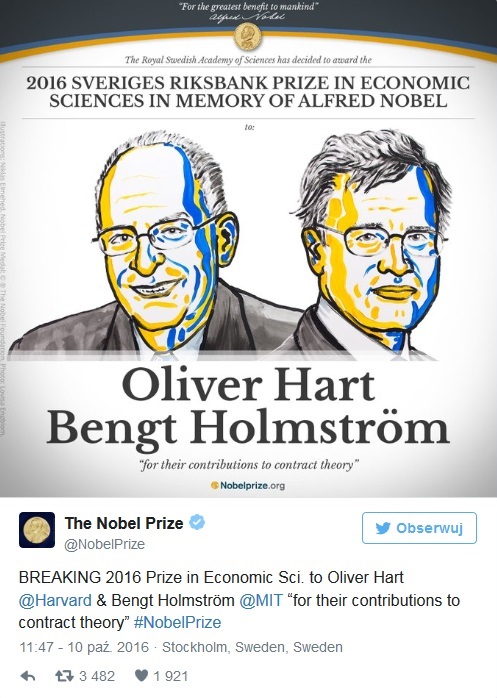
This year’s Nobel Prize in Economic Sciences went to Oliver Hart and Bengt Holmström, specialists in contract theory. We asked Prof. Ewa Okoń-Horodyńska, head of the JU Chair in Economics and Innovation to comment on the decision of the Nobel committee.
The Nobel Prize in Economic Sciences differs from scientific prizes, since it wasn’t instituted by Alfred Nobel, but by the Swedish National Bank. Up until now, it was awarded 47 times, starting in 1969. The amount of money given to its laureates is 8,000,000 Swedish kronas, or 830,000 euro.
This year, the Nobel Prize in Economic Sciences was presented to two 67-year olds, Oliver Hart form the Harvard University and Bengt Holmström from the MIT, although it came as a bit of a surprise. The Royal Swedish Academy of Sciences decided to award them ‘for their contributions to contract theory’. As usual, there are many discussions as to whether its decision was right. Those who disagree argue that there are more relevant contemporary economic issues, such as developmental risks, migration crisis, and international economic relations. However, the world around us is filled with various contracts, and modern economies are integrated by a great number of them.
 Business, employment, work, politics, power, health care, insurance, art, and sometimes even family are subject to numerous contracts. The Nobel Laureates’ research subject is related to regulations that apply to every human being; indeed, it’s safe to say it's concerned with the most common and mundane aspects of reality. That means it’s very much important from the society’s point of view, since there are several issues inherent to contracts: are they fair? Do they protect every party? Are they meant to spread misinformation? And most importantly, do we fool ourselves when we think that every potential disagreement between the parties can be foreseen and regulated by the contract?
Business, employment, work, politics, power, health care, insurance, art, and sometimes even family are subject to numerous contracts. The Nobel Laureates’ research subject is related to regulations that apply to every human being; indeed, it’s safe to say it's concerned with the most common and mundane aspects of reality. That means it’s very much important from the society’s point of view, since there are several issues inherent to contracts: are they fair? Do they protect every party? Are they meant to spread misinformation? And most importantly, do we fool ourselves when we think that every potential disagreement between the parties can be foreseen and regulated by the contract?
Oliver Hart and Bengt Holmström have created new theoretical tools, devised the contract theory and the methods by which contracts can be assessed from the economic point of view, developed a comprehensive framework for an analysis of various aspects of draft contracts, and proposed new ways to mitigate the consequences of disagreement between parties. The results of their research has practical applications, which they demonstrated by analysing the earnings of CEOs of large companies. The research is important for understanding of the rules governing the economy as well as potential irregularities in draft contracts. The Nobel Laureates state that it’s much more productive if the contracts provide incentives for employees to identify with the company’s long-term interests rather than their own. Nevertheless, although contract theory is one of the basics of economics, it’s still difficult to explain in simple words.





